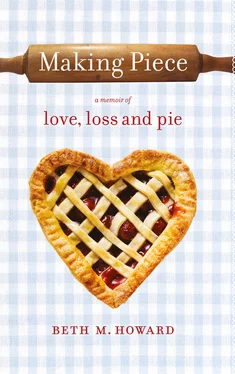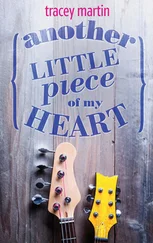Beth Howard - Making Piece
Здесь есть возможность читать онлайн «Beth Howard - Making Piece» — ознакомительный отрывок электронной книги совершенно бесплатно, а после прочтения отрывка купить полную версию. В некоторых случаях можно слушать аудио, скачать через торрент в формате fb2 и присутствует краткое содержание. Жанр: unrecognised, на английском языке. Описание произведения, (предисловие) а так же отзывы посетителей доступны на портале библиотеки ЛибКат.
- Название:Making Piece
- Автор:
- Жанр:
- Год:неизвестен
- ISBN:нет данных
- Рейтинг книги:3 / 5. Голосов: 1
-
Избранное:Добавить в избранное
- Отзывы:
-
Ваша оценка:
- 60
- 1
- 2
- 3
- 4
- 5
Making Piece: краткое содержание, описание и аннотация
Предлагаем к чтению аннотацию, описание, краткое содержание или предисловие (зависит от того, что написал сам автор книги «Making Piece»). Если вы не нашли необходимую информацию о книге — напишите в комментариях, мы постараемся отыскать её.
Making Piece — читать онлайн ознакомительный отрывок
Ниже представлен текст книги, разбитый по страницам. Система сохранения места последней прочитанной страницы, позволяет с удобством читать онлайн бесплатно книгу «Making Piece», без необходимости каждый раз заново искать на чём Вы остановились. Поставьте закладку, и сможете в любой момент перейти на страницу, на которой закончили чтение.
Интервал:
Закладка:
But, no. They said things like: “You were going to get a divorce anyway, so I don’t know why you’re so broken up.” “The timing of his death was good; if it had been in October, it would have interfered with our party.” “I don’t believe in an afterlife; when he’s dead, he’s dead.” And, oh, here’s another good one: “I lost my mother last year and, believe me, it only gets harder.”
Those were only a few of the gems worthy of a David Letterman Top Ten list. The less outrageous but equally insensitive comments included: “It was his time.” I heard that one a lot. And “He’s in a better place now.” Really? You don’t think he’d rather be riding his new LaPierre road bike through the Italian countryside? How do you know what place he’s in and if it’s better? No. Not helpful.
My mom had contributed her share of questionable commentary, and it would take me many months to turn my anger toward her into compassion, which is why I was keeping my conversations with her to a minimum. It had been only one month since Marcus’s death, and I was not only angry with my crew of commentators and their unsolicited opinions, but also with myself. My own harsh words ran in my head like a heavy-metal song stuck in repeat mode. I couldn’t find a quiet corner anywhere. The outside comments were bad enough, but the noisiest ones were inside my own mind.
Just a few hours before my inaugural grief support group, I called my mom to check in. I was greeted with the same innocent question that anyone would ask in any given phone call. She simply asked, “How are you?” I know, I know. It’s a benign question, a conversation starter not meant to be taken literally. But I was not able to answer with the standard throwaway line, “I’m fine.” I couldn’t lie. Grief was like that. Grief was like truth serum that magnified each and every speck of life’s minutiae. Every little thing felt so important, so urgent, so serious. If Marcus had died so suddenly, then I could, too. Anyone could. Not only that death could happen, but that I wanted it to come; I wished for it. My desire to keep living was diminishing with each passing day. Life became so fragile. I was fragile. I was definitely not fine.
So instead of giving the standard answer, I said, “That’s just not the right question to ask.” Okay, so I could have been nicer. I could have— should have—just lied. I didn’t need to take my pain out on my own mother. I didn’t need to drag her down with me into my Grief Pit. She was quick to lash back and her response stung me like a scorpion bite. “Well, I just don’t know what to say to you anymore!” she snapped.
Another thing about grief is that it gives you permission to take care of yourself in a way you never knew how to before. My animal instincts kicked in and I recoiled into the safety of my shell. I was a grieving widow who needed to take care of herself. So with the sting still smarting, I did what any self-respecting, self-protecting widow would do: I hung up on her.
I found my way to the third floor of Good Samaritan Hospital with ten minutes to spare before the start of my first session in the grief support group. I had been to individual therapy off and on over the years, and I had hauled Marcus to a few sessions of marriage counseling, but I had never been to group therapy. I liked the idea of sharing my deepest, most intimate issues in a group setting about as much as I liked being a widow. But I was desperate for help. And it was free. I took a seat in the circle of chairs and waited for the two-hour session to begin. I was still upset by the aborted phone call with my mother. Hell, I was still upset about everything, about Marcus’s death ripping my life so irreversibly apart that I was now sitting with an assortment of strangers listening to their stories about death and dying.
One by one, going around the circle, they each took a heartfelt turn explaining how they were coping, how they were still trying to find meaning in life two years after their spouse was gone. What? Two years? I could still be sitting here two years from now, trying to get my life back together? I would rather be dead. Why couldn’t I have been the one to die? A man in his thirties, whose wife died a year earlier of a degenerative disease, finished speaking and then it was my turn.
“Hello, my name is Beth Howard. I just moved back to Portland after my husband, Marcus …” I didn’t get very far before the tears bubbled out like boiled-over pie filling. In a matter of seconds, I was choking on my own spit, globs of snot running down from my nose and into my mouth. I eeked out bits of my history. “And then, as if that wasn’t bad enough,” I continued between heaving sobs, “I hung up on my mother today.”
I was gasping for air, crying so hard, I could barely get the words out. I finally stopped talking and when I ventured a look around at a few of the faces in the circle, I was met with a round of solemn but compassionate nods. This was a knowing group who had all been there, done that, but they were all much farther along in the grieving process than me. No one else had lost it during their introduction like I had. They had all delivered their stories with composure and a detectable—an enviable— trace of detachment. I was a newbie. I was raw. Too raw. I didn’t belong in this group. I didn’t—couldn’t even if I wanted to—speak again after that. Eventually, as the spotlight got turned to someone else, I was able to scale back my sobs to the normal faucet flow of tears and sat quietly for the remainder of the evening’s discussion. When the session came to a close, Susan, the group facilitator, asked to see me. She led me to the far corner of the room, away from the others.
Susan was a roundish, middle-aged blonde with a quiet voice and gentle, calming energy. She was comfort in a burgundy-colored pant suit. She was a slice of warm apple pie. This grief counselor, this angel sent from heaven, looked me in the eyes—what little she could see of my eyes through my swollen eyelids—and said, “I’m worried about you. Are you going to be okay tonight? Do you have someone you can be with? Are you okay to drive home?” Oh, boy. Some angel. I was in trouble. I wanted to be the star pupil, ace the test, be cured of my sadness and depression in one, maybe two, easy sessions. The joke was on me. I wasn’t going to win the Spurs Award. I was going to be committed to the psych ward.
“I’m fine,” I insisted. I couldn’t tell my mom I was fine, but I was in no position to give any other answer to Susan. I wasn’t fine, and didn’t know if, or when, I’d ever be fine, but Susan didn’t know me well enough to know tonight’s breakdown was normal for me—or the “new normal,” as the grief books put it.
I wanted to throw those stupid, fucking grief books against the wall when they talked of this “new normal.” I wanted my “old normal” back. I wanted Marcus to be alive. I wanted to turn back the clock and be a better wife, to not get mad at Marcus for working so much, to complain less and love more, to have never asked for that divorce. I didn’t want to feel this way, to live in distress, walking through life in a daze, overly sensitive to some things, completely numb to others, to spend my days with a death wish. I was cognizant enough to know my “new normal” wasn’t healthy. It wasn’t something I could continue to live with. But after a month I had gotten somewhat accustomed to it. I was getting familiar with touching the void, plunging into the black hole of sadness. I knew what it felt like to flounder in the ocean of despair, to be pummeled by tidal waves of grief and held under in their suffocating darkness.
I wasn’t afraid. I was just … well, okay, I might have been borderline suicidal. I certainly thought about it, but I wasn’t going to kill myself. Not tonight anyway. My friends Alison and Thomas had dinner waiting for me and all I wanted was to get out of this hospital meeting room and back to the warmth of their home, eat a filet of grilled salmon served with pesto made from their garden, and drink a glass or three of wine while listening to Alison’s infectious laugh.
Читать дальшеИнтервал:
Закладка:
Похожие книги на «Making Piece»
Представляем Вашему вниманию похожие книги на «Making Piece» списком для выбора. Мы отобрали схожую по названию и смыслу литературу в надежде предоставить читателям больше вариантов отыскать новые, интересные, ещё непрочитанные произведения.
Обсуждение, отзывы о книге «Making Piece» и просто собственные мнения читателей. Оставьте ваши комментарии, напишите, что Вы думаете о произведении, его смысле или главных героях. Укажите что конкретно понравилось, а что нет, и почему Вы так считаете.












